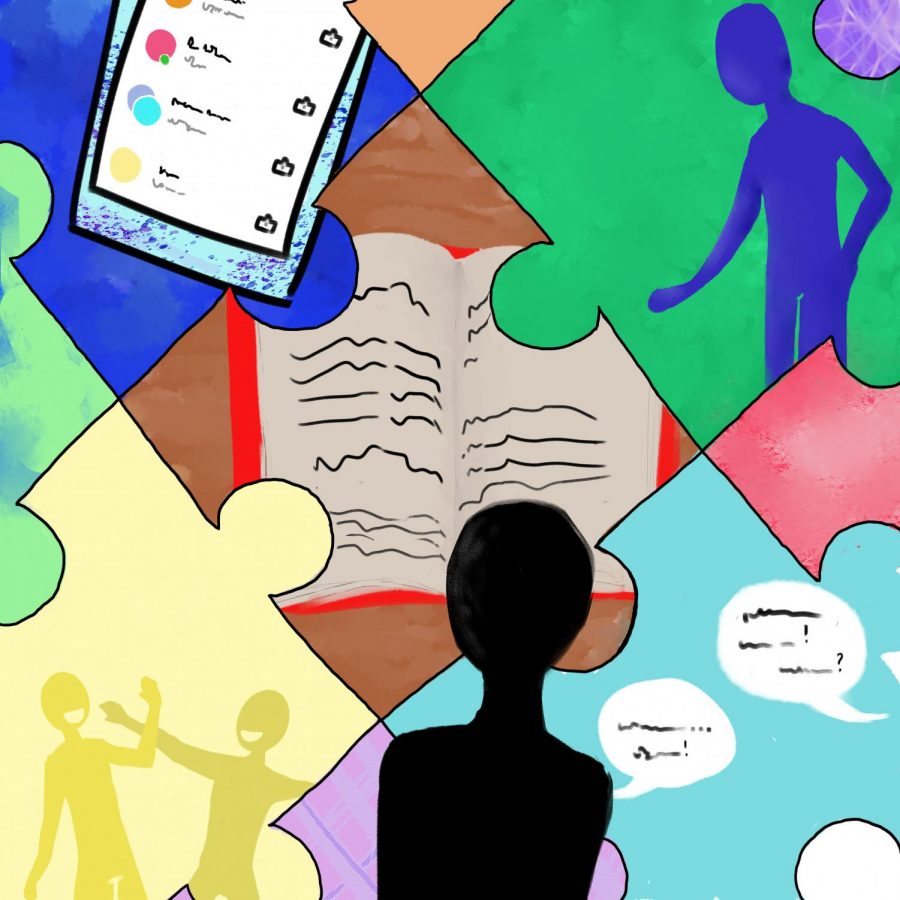Should Have Known Better: The Responsibility to Influence Children and Teens
VARIOUS INFLUENCES Children are expected to act appropriately from a very young age. They are taught to always be polite, use basic manners, and treat people with kindness. With so many expectations for developing children, the responsibility to teach them proper behavior can fall on several different influences.
December 5, 2018
Children and teenagers are expected to embody appropriate behavior. This entails having proper manners and knowing how to respond to situations with suitable actions. Individuals are taught to teach everyone they encounter with respect (especially to those who are older) and kindness, as one ideally should not make harsh initial judgments about others. People are supposed to control their tempers, be humble in their accomplishments and meet the expectations of adults in their lives. If adults are relying on children and teenagers to act appropriately, then whose responsibility is it to teach them this behavior? Freshman Aaron King says, “To have appropriate behavior, you should have 100 percent responsibility.” If a student gets into a physical fight with a peer, many claim that they “should have known better.” But as many students come from differing backgrounds with different home situations and experiences, can everyone really be expected to “know better?”
One’s parents or guardians are their first teachers; proper behavior starts at home as parents are often people’s prominent first influence. Parents teach their children how to ride their bikes the importance of controlling temper tantrums, and how to play fairly with the kids in the neighborhood. Children learn basic life lessons from their parents or guardians in the form of direct lectures or more subtle approaches. Discipline is implemented in order to teach children to correct improper actions. Sophomore Benton Owens explained that growing up, his parents would take things away from him; “Just showing that not everything is given to you is a good way to do it. If you’re not having good behavior, why should you be rewarded?” Privileges should be earned to demonstrate what is expected of children at a young age. Yet parents also have the responsibility to teach their kids how to be calm, cool and collective. Junior Jacob Hertzberg believes that “sitting the kids down to talk about their behavior” is the best approach to positively discipline a child “because you tell them what they’re doing wrong and how you can help them.” Expecting respect begins with respect; when children and teenagers are calmly listened to, they are more likely to alter their actions.
Many parents who become involved with their children’s life have the best intentions at heart. But perpetual involvement in a student’s academics can lead to unnecessary strains and pressures. There are parents who constantly ask their children how their last math test went, if all of their homework is done and remind them how important it is to study to have a successful future. This constant attention makes students feel as if success is the only option, even when it is unrealistic or arduous. Personally, I am very grateful for how my parents were involved with my academics. They were always interested in what I was learning in school and offered encouragement when I was overwhelmed with a particular class. It is often challenging to find a balance between being supportive and being too involved.
But what about all the children who do not have the same support from parents or guardians? Everyone has different situations at home and thus varying experience, so is it wrong to place responsibility on parents and guardians to teach students appropriate behavior? Some conclude that teachers are thus accountable for teaching students life lessons as they are with teachers for an average of seven hours every day, five days a week. Especially at younger ages, school is where children meet their first friends and get into their first conflicts. Teachers resolve disputes and use discipline when necessary. In pre-school and elementary school, children are still developing and thus have to make many mistakes to learn the difference between right and wrong. As students get older, teachers still often outline classroom rules and expectations, but do not constantly remind students what kind of behavior is right or wrong. Teachers subtly have let the responsibility of one’s actions fall on the individual. In middle school, students were told to never use their phones, or they would be taken. As we get older, teachers are not as persistent about no phone policies. They know that students who focus their attentions on distractions are only damaging their own capability to understand content by not paying attention. Teachers have the responsibility of educating students on a particular subject; life lessons are a bonus, not the exception.
Teachers usually intervene when a student is being disruptive to the class and is hindering the learning of their peers. In extreme cases, parents are called to ensure that their child changes their behavior. Serious offenses such as plagiarism or the possession of illegal substances on school property, are met with strict punishments involving suspension or expulsion to set a harsh example and ideally alter a student’s behavior.
The trouble arises when teachers and faculty have to make a decision to intervene in a student’s personal life if they suspect a complication. Some students want a clear distinction between their academic lives and their personal lives; intervention may been seen as an invasion of privacy. Junior Sara Girmay says that if teachers “see signs of this person failing or with some mental health problem, I think they should hint at some help and let them know they have options, like counselors.” But she believes that if teachers try to be too obtrusive, students will not respond positively and close up about a problem. For some, school is the only available outlet to receive assistance in their lives with a conflict. Senior Audrey Jacobson says, “I think [school intervention] depends on whether or not it is the student’s safety or the student’s success. If it’s about student success, it’s more of a family issue; when it’s about student safety, then obviously their parents aren’t doing something that’s necessary and the school should take action.”
Issaquah High School has also been testing out new ways to potentially help students in their lives. Social-Emotional Learning (SEL) lessons have been teaching students about managing academic pressure, the importance of using social media appropriately, and many other topics that are relevant to students’ lives. Society also plays a key role in influencing students’ behavior. We live in the age of social media where mocking people is often seen as comedic and children and teenagers are exposed to content that show dangerous actions, and normalizes disrespectful behavior. Sophomore Ella Hart says, “I think sometimes social media can be very harmful in that way because people think they can say whatever they want and get away with it. But since what you say is on the internet forever, people do crack down on people if they say [mean] things. This instills a little fear in you to be respectful.” Society teaches people basic social etiquette which is invaluable towards being a functioning member of society.
In all honesty, I wanted to write this article because of a conversation I had with a teacher last year. A student had brought an assault rifle to his school and killed several of his peers. Many people were arguing that his teachers and other adults in his life should have noticed signs that would have prevented the tragedy. But if teachers are expected to constantly be aware of students’ personal lives, when does it stop? It is impossible to expect teachers and other adults to be aware of everything happening in a child’s life. Senior Raj Kumar believes that a balance has to be reached: “The student should ultimately face the consequences of misbehaving. If a parent cannot teach the child to behave properly, the teachers involved may not as well. It is hard to say, but the student, their parents, and the teachers all have some sort of responsibility in the appropriate behavior of the student.”





Kaitlin D'Souza • Dec 11, 2018 at 8:46 am
I think everyone in a society is responsible for modeling good behaviour for young adults. It’t not just up to the parents or the teachers because they can’t be accountable for all social and emotional learning. I think peers and community members also have a large influence in how teens develop and should promote good behaviour to foster a safer, more prosperous community.